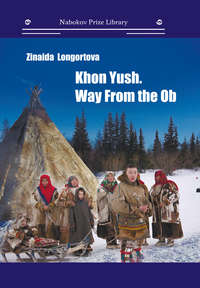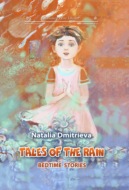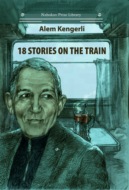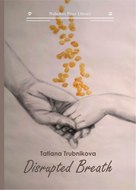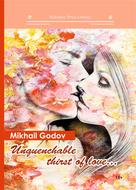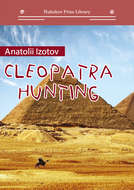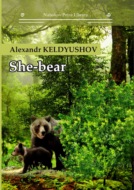Kitabı oku: «Khon Yush. Way From the Ob»
© Z. Longortova, 2020
© International Union of writers, 2020

Zinaida Viktorovna Longortova was born on June 22, 1962 in the village of Kushevat, Shuryshkarsky district, Yamalo-Nenets Autonomous Okrug, Tyumen region. She studied at Gorkovskaya high school.
Graduated from Salekhard Pedagogical College named after Anatoly Zverev in 1983, speciality: «Primary School Teacher».
Graduated from Herzen University, St. Petersburg, in 2000, speciality: «Cultural Expert», «Teacher of History».
Now works in «Yamal-Region» State Television and Radio Company as a senior editor of the RPNS editorial board. She is the author of «Northern Color», a program in Russian, and programs in the Khanty language like «Tut Sultam». Since 2007, the programs «Teacher of the North» and «Inspiration» were published.
Yamal residents know her well as a publicist. She has published several books with the support of the Department of Indigenous People and «Yamal Writers»: «Monsyan mov. The Land of Fairy Tales», essay «The Teacher of the North», novels «Near the Bluewater Ob», «Sun Glare of Birch Bark», «Near the Fish Priver, On the Deer's Ground», «Imi Khily», «Ovas muvem schcashchty syit». In 2019, she published her first novel «Khon Yush. Way from the Ob».
Her works were included in the anthology of writers of the Yamalo-Nenets Autonomous Okrug and Khanty Literature of the Khanty-Mansi Autonomous Area.
She was published in magazines like Yamal Meridian, The Northerners, The World of the North, in the newspapers Khanty Yasan, Luh Avat, and Red North. She writes stories in Khanty and Russian.
Zinaida Viktorovna is a laureate of international, Russian, district television and literary contests for books, documentaries and feature films between 1990–2019, as well as a winner of a special prize of the Governor of Yamal for creating, preserving and promoting cultural values of indigenous small peoples of the Far North in 2019.
She has been repeatedly awarded with different diplomas and certificates. Veteran worker, writer, member of the Union of Journalists of Yamal-Nenets Autonomous Okrug and of Russia, Honored Worker of Culture of Yamal-Nenets Autonomous Okrug, master of decorative and applied art of Yamal-Nenets Autonomous Okrug.
In 2007, the «Wedding Argish», a movie in Khanty language was created depicting the worldview of the Khanty people. The film took second place at the Golden Tambourine International Television Competition in Khanty-Mansiysk. It also took 3rd place at Tyumen regional competition «White spots of Siberia». She was awarded a 3rd degree diploma in Murmansk at the international television competition «Northern Character» for professionalism and dedication to her topic.
In 2018, work was completed on the first movie in Khanty language about the Khartaganov family, which saved seven orphans during the Great Patriotic War. The film «Khon Yush. Way from the Ob» received Gazprom Neft prize «For the Preservation of Cultural Traditions in 2019», as well as Grand Prix for documentary films at the International Cheboksary Film Festival and a special prize «For the Work of Life» at the Chukotka Film Festival «Golden Raven».
She is actively working in the public movements of the district: she is a member of the Union of Journalists of Yamal and Russia, member of the city association «Yamal To Its Descendants!», member of the national cultural autonomy of the Khanty «Pulngavat», member of the international movement of writers AFUL. Member of the jury of the literary competition of readers «Melodies of the Arctic Circle» as part of annual «Rugin Readings», member of the jury of the district folk competition; member of the jury of the interregional competition on local history and mother tongues of the Department of Education of the Yamal-Nenets Autonomous Okrug GAU DPO. Often meets with residents and students of educational institutions in Salekhard, Labytnangi, Novy Urengoy, Noyabrsk, Gubkinsky, Khanty-Mansiysk District and students of the district schools.
1937
Special Resettlers
On a cloudy September morning, a steamboat with a barge loaded with special settlers from Tyumen, Omsk, Tobolsk and Ishim approached the wooded side of the Ob River.
The dispossessed settlers sat or lay on the iron bottom of the barge. Putting on all the clothes, they rolled themselves into a ball from cold, trying to preserve the last warmth. These people did not even know where they were going to. They could only guess by the cold that was getting more severe every day: the dank autumn stain penetrated to the very bones. The river kept on carrying their barge towards the icy Kara Sea. They traveled along the Tyumenka, the Irtysh, the Tobol, and for many days along the mighty river Ob, which was high as the sea.
Some people left two days ago in the village of Kushevat, spread out on three hills in a cozy quiet channel. This time, those who went through many repressions, apparently, had to huddle along the Ob River, open to all the northern storms. According to the lists that the authorized NKVD officer read yesterday, some people were taken to the next settlement, Shuryshkara.
From 1917 to 1922, the Civil War was going on in Russia. Various classes and social groups of the Russian Empire fought for power. Striving to achieve their political goals, Opponents of Bolshevism united in large groups to overthrow Soviet power.
With the support of foreign states, they violently destroyed the working-peasant class, which actively supported the Bolsheviks. The losses of the Red Army and the civilian population were estimated at more than thirteen million.
In 1930s, the desire of the leadership of the Bolshevik party to implement the ideas of the world revolution led to many decisive actions. Stalin felt the danger and took radical measures before the Great Patriotic War.
March 1937 went down in the history of the country as the beginning of the «great terror», which became the highest point of repressive politics, the peak of political repression in the Soviet Union.
From February 23 to March 5, 1937, the Plenum of the Central Committee of the All-Union Communist Party of Bolsheviks was held, at which Joseph Stalin made a keynote speech «On the Shortcomings of Party Work and Measures to Eliminate Trotsky ist and Other Deceivers». He said: «…the more we move forward, the more success we have, the more the remains of the broken exploiting classes become embittered, the sooner they go to more acute forms of struggle, the more they harm the Soviet state, the more they clutch for the most desperate means of struggle as the last means of the doomed.»
The main enemies of the Soviet state were Trotskyists, who, according to Stalin, turned into «… an unprincipled gang of pests, saboteurs, and spies employed by some intelligence agencies.» «In the fight against modern Trotskyism» he called to use not the old methods, not the methods of discussion, but the new methods, the methods of uprooting and destruction.
The NKVD of the USSR had a clear goal: to destroy «enemies of the people.»
On July 2, 1937, the Politburo Resolution «On Anti-Soviet Elements» was issued.
All repressed people were divided into two categories according to the measure of punishment. Those assigned to the 1st category were expected to be executed, while the 2nd category was left for imprisonment in camps for a period of 8 to 10 years.
The NKVD punishing sword was supposed to hit numerous enemies, regardless of their location. Everyone who continued to «conduct active anti-Soviet subversive work,» wherever they lived: in a village, a city, on collective farms, state farms, were expelled with confiscation of property. All «hostile elements» were recorded and repressed.
Having accepted all their property, livestock and agricultural products on the forms of exchange receipts, they took special settlers to various regions of the Soviet Union for labor settlements as directed by the NKVD, including the Omsk Region, which included the Shuryshkarsky District in 1937. It was renamed from the Ostyak-Vogul to the Yamalo-Nenets National District.
The guards ordered the arrivals to leave the barge ashore. Men, women and children straightened up in hope that they might survive on this unknown land, emerged from the river fog onto the rocky river banks.
«Though it's north, look how beautiful it is!»
Arriving guests admired the cheerful autumn colors of a rare forest. Exhausted by a long road, the settlers studied their new refuge with excitement.
«It's not that bad: if we die on the ground, they will not throw us into the river,» two women talked among themselves. «The river is so wide and fast. So many corpses were thrown on the road. Where did it take them?»
«You won't find them now!»
«Yes. And who's going to search?»
«Look! There are people on the hill!» one of the arrivals shouted. Everyone looked at the hillock, where the girl pointed. Indeed, there were locals, carefully looking at strangers. Their faces, stature and unprecedented clothes embroidered with patterns were very different from the guests.
A little higher, behind a long sandy shore, on a small hillock among the taiga wilderness, the Khanty village of Pitlourkurt hid.
«Maybe we'll survive. After all, people live here.»
«I know,» the boy intervened. «These are the Khanty. I read and they said at school that below the city of Tobolsk, along the river Ob, there were lands of the Khanty people, and the Nenets are closer to the Gulf of Ob.»
«Or maybe they are not Khanty or Nenets at all?» suggested his mother, restlessly holding the talkative boy. «Although you know everything, you are here for the first time.»
«No,» the boy objected. «We were not taken to the ice of the Gulf of Ob, to the tundra. It's the forest tundra, which means we are in the territory where the Khanty live.»
«Stop talking!» shouted the escort.
«Hush, look!» whispered the woman who was just talking animatedly. «I hope they don't hurt her».
A young pregnant Tatar shrank under the cries of the guards wearing the NKVD uniform and hurried to the shore, bent double.
«Look, the girl survived and got to the ground.»
«Everything mixed up in this world! Why are we punished? Why is this girl tormented?»
«I had only one cow and I'm here for it now. They say I'm a kulak…» a woman said, exhausted to the extreme. She became even thinner over the journey, and it seemed that her skeleton was covered with thin skin, which was about to tear. Her eyes shone with kind and quiet light.
«And I always had a good household,» her friend straightened in misfortune, remembering the past prosperity. «It's painful for people to look at someone else's good, and here we are destitute.»
The second woman did not get thinner during the long journey. She squinted her eyes and looked evilly at the escorts and strangers. Everything annoyed her. She seemed angry at the whole world.
The arrivals moved to the shore in a row.
«Faster!» Shouted the guards. «Hurry up!»
People silently looked around. They carried ashore the bodies of those who got frozen at the barge that night. The guards hastily distributed shovels among the settlers – to dig holes for the graves. They buried the dead, leveled the land, and drove people higher up the hill.
Autumn has already taken over. The morning was hazy, gray and inhospitable. Fog crawled low over the river, covering the dark waters of the Ob with a light haze. It went in colorless paths along dried Pitlyar litter, along small streams, stretched out like a mosquito haze along the taiga light forest, painted with cheerful colors of autumn, affectionately hiding the warm earth with gentle swan fluff.
At that moment, as if mourning the restless souls of all those who had died on the barge from hunger and cold, women cried higher on the hill. The guards were taking three men in old suede malica to the river.
Earlier that morning, when the horizon was slightly twisted with the silver threads of khutli – dawn, a kayak boat docked on the shore of Pitlourkurt. There were two reindeer herders and a man wearing the NKVD uniform. He jumped out first, followed by Iakov Matveevich Tyrlin. He helped the old man with sparse braided hair, faded like the feathers of an old haley – a Siberian gull. It was Taras Nikonovich Rusmilenko. Both were tired and tried to stretch their arms and legs.
People were brought from afar, from the villages of Vulykurt and Khashkurt that lay upstream of the river. Three days ago, shamans could not be found in their native villages where they arrested many «enemies of the people», but nevertheless they caught them in hunting huts. Now they had to catch up with the ship that was going towards Salekhard.
Seeing Iakov Matveevich, a fair-faced, fair-haired man over forty, the villagers respectfully bowed their heads, but hid their eyes. For many kilometers along the Ob, people revered this man, the Great Shaman, nicknamed «Lylan Luhpi Shepan iki» – the «Living Spirit», which had a special gift of healing serious illnesses. They could not help him in anything and therefore only bowed their heads in deference to the man who had helped them in difficult times, to his heavenly gift.
His married daughter, Vurty Matra Khashkurne, who was married in this village three years ago, ran to the boat. She had already been informed that the authorities had brought Lylan Luhpi. She rushed to the shore like a breeze, but even then she did not forget to cover her face with a beautiful burgundy shawl with long white tassels and a rim blue as a river. It was an ancient custom. She was not the one to establish it, and not the one to neglect it.
On the day of the matchmaking, each girl covered her face with the edge of her headscarf forever, hiding her from the eyes of her husband's older relatives. From that day, not a single self-respecting man: neither an old man whose hair was foamed with gray Ob waves, nor a father-in-law, nor any other of her husband's relatives – dared to look at her daughter-in-law. This has been done according to the traditions that were once established in ancient times.
Hashkurne wanted to rush into the arms of her father, but was blocked by the escort:
«Where are you rushing, you mad girl! You can't come here. Don't you see? These are enemies of the people!»
She hesitated and stopped halfway, puzzled, as if delving into something, carefully examining the escort. Knowing the calm nature of his daughter, her father prudently shouted:
«No need to cry, daughter, I'll be back soon!»
The quiet, obedient Khashkurne did not answer. She carefully covered her face with a handkerchief, as if hiding from everyone, and quietly fell silent, hidden in a crowd of curious women.
Residents of the Pitlourkurt village cried for people on whom their lives were based. One woman grabbed her husband's clothes and, unable to hold him, fell to the ground. She did not let go of the hem of his malica, and her body dragged lifelessly after him.
Vasily Ivanovich Khartaganov, local, was a young, forty-four-year-old shaman. He tried to pull the edge of his clothes from his wife's fingers, but apparently they had convulsions, so she couldn't unclench them. The guards withdrew her hands from malica with force, but nothing helped. The shouldered short man, trying to stay calm, continued to walk towards the shore after his fellow tribesmen.
Nearby villages that day were left without support, without shamans, without doctors. Since ancient times, they supported their people, served as a bright guiding star, a clear moon and a warm sunbeam in the life of this snowy land, which was not always easy.
«Damn shamans! Let him go, you fool!» Shouted the guard.
The guards were already used to the grief of others. Women cried in every village, some of them even rushed at people in uniform. Particularly active were beaten with whips. This was their task: to cleanse the society from dangerous people, the brave, wise freethinkers. To protect people from themselves, shuffle, reorganize, put them in place. It was like removing a leader from a deer herd, decapitating a motley stock and driving everyone into a snowstorm. If a wolf pack attacks, only the fastest, the strongest and, of course, the most cunning will survive.
Father of the nations Stalin was to foresee any discord in a large multinational family. Riots were eradicated without delay, using any methods. Otherwise, there could be trouble.
The leader's iron hand reached «to the very outskirts» of the Soviet Union. There was no way to hide in the taiga wilderness or in the endless tundra of nomadic reindeer herders, nor in the marshy swamps of the Ob North.
The decisions of the Politburo of the Central Committee of the АН-Union Communist Party of Bolsheviks and the orders of the NKVD in 1937 brought fear, hopelessness, denunciation and spying, including to the North. They were looking for spies everywhere. The planned tasks, figures and norms for the arrest of «enemies of the people», approved in the center, served as a guide for the local NKVD bodies. They had a kind of social competition for the greatest exposure of «enemies of the people.» The arrests of shamans and «kulaks» destroyed the indigenous peoples of the North. Instead, the leadership assigned obeying people able to bow their heads before the authorities. But here, in the dense swampy lands, among the small peoples of the Ob region, accustomed to roam freely along their hunting and deer paths, through the vast expanses of their native land for centuries, there were still few of them.
Therefore, today the main representatives of these people, confident in themselves, silently moved to the unknown. Like an unbending trunk of a cedar, they did not bow, and did not lower their heads. And it did not matter that there were few of them among the so-called shamans. The storytellers, stewards of sacred rites, the mind and power of the people, went away forever and nowhere. In today's mess, no one could disobey the Father of Nations. The police, the NKVD, even if they wanted to help someone, did not have the right to do so. They were firmly accustomed to the forgotten Khanty mountains, bringing them into a new order.
An elderly woman in front of the crowd pushed her old man:
«Help me unhook her fingers. She's got three kids without a father at home! They can take her!»
Together, they went to Khartaganov's crying wife, dragging lifelessly after her sweet, most dear man in this world. The young shaman, realizing what could happen to the mother of his children, tried to tear off the hem of his clothes. He finally managed to grope and tear a weak spot along the seam of his malica, sewed in the evenings by his Khutline – the morning dawn of the young shaman. As he walked, he continued tearing off the wide hem of his clothes. Skilful stitches sewn with reindeer veins gave in with difficulty. Finally, he stepped over the torn part of the malica, leaving it in the hands of the one that was half of his soul, half of his heart. His beloved remained sobbing angrily at the earth.
«Heia!» The crowd was agitated. «Your husband won't come back. Don't you howl like that!»
«He tore his clothes alive. Bad sign.»
Long winters and frosts in the North established their conditions for the funeral rites that had appeared in distant times, when people got used to live among the eternal snows. It was believed that in the «lower world» the dead live an ordinary life, so they need all the necessary utensils, including clothes. Women were buried in a new yagooshka, and men were buried in their malica. During the funeral, all things were spoiled – torn or cut with a knife. With a hatchet they cut sleds into two halves.
Today, the shaman tore his clothes going on a long journey. He knew the customs, but the family was more important than the ancient customs.
Keeping his dignity, the man, not knowing what would await him ahead, without bowing his head, went to the barge. Without looking back, he walked to its middle.
Khashkurne, not seeing the grief of others, with a heart breaking in her chest looked only after her father and whispered:
«Come back home! You promised!»
The escort, having seated three shamans, ordered to move ahead – and the steamboat rattled again, firing a black column of smoke. Under the female cries, the cry of children, the barking of dogs, the vicious screams of the Ob big gulls «Chale, chale, chalev, chalev!», the steamboat headed to Salekhard, which was Obdorsk a couple of years ago. There were more shamans there that needed to be taken to jail.
«They will be taken to the south, to Tobolsk, or Omsk,» said an obsolete woman, «they say they put shamans in prisons.»
«And they brought us to the North. They are unaccustomed to heat, so are we to cold. This is the punishment, but for what?» her friend asked, not addressing anyone.
«No, we were torn from our native land, from our roots. Not only the plant dies without roots, but also people.»
«But man is not a tree. We still have a head and hands. Hopefully, we will not die of longing and hunger!»
«The main thing is that we were not sent to prison. We will live free.»
«Why are you standing here, kulaks? Settle down, prepare a place for dugouts. You will dig tomorrow. Otherwise, in the open air you will die before winter!» Shouted the fair-haired man in uniform.
«So we'll spend the winter here?» The woman said.
The crying Khanty slowly moved to their village.
«Lucky ones, they are free, free!» – the woman said enviously. «They go whatever they want.»
«Who knows if we have free people today?» The second woman answered, looking at the grass that had died before winter frosts.
Morning. The colorless faded sun appeared on the edge of the earth behind a strip of still green talniks. The horizon slowly tinged with pink, encouraging shades. A gray sky with sparse clouds foreshadowed good weather without rain. Pink stripes, a multitude of the thinnest long fingers of Sorni Nye – the Sun, divided the mighty river into two halves. The water has already become lighter from the south side of the Ob, but from the north the rays of Sorni Nye fingers have not yet illuminated the deep waters of the Ob river, sacred for all Khanty, darkened during the night. The mighty As flows, powerfully carrying its boundless waters to the north. And on top is the beauty of the swaying Ob wave on the river and the peace around.
A man and a woman from yesterday's village were returning from fishing early in the morning. They landed on the shore where a barge had stood the day before. The man pulled out a light kaldan boat, picked up a full bag of fish, and carried it to the people sitting and lying on the ground. This was the law of hospitality of the small Khanty people – not to leave guests that descended to your land hungry.
«Where are you going?» a fair-haired guard blocked the way to the old man. «What do you want?»
A small fisherman was smiling friendly, carefully and affectionately looking at the guard. Pointing at the bag, he explained in broken Russian:
«Fish. Eat!» Pointing to people and fish, the elderly Khanty tried to explain his arrival. The guards, looking at the bag with a fresh catch, began to talk:
«I'm really hungry. Maybe we should take it?»
«But why did they bring the fish? With what intent? Maybe they want to report on us?»
«They are always naive, meet everyone, treat them to tea!»
«Let's take the fish. I'm sick of these canned foods!»
«Let's give kulaks the remains. They should eat something hot. It's been a month without hot water!» Without further ado, the fair-haired guard pulled out a bag of fish from the old man, apparently their leader, and dumped the contents onto the grass. Fish, still alive, especially pike, moved their gills heavily without life-giving moisture. Returning the empty bag, he quickly pushed the old man to the shore:
«Get out of here, old man! You have nothing to do here. Or you will be taken to jail on a barge!»
No longer burdened with luggage, the man calmly, pleased that the guests would be full, walked to the boat without any fuss. Not knowing the Russian language, he could not understand that he was threatened. He had to put the networks in order, so there was no time for this talkative man in uniform. The could talk next time over a cup of tea.
Rowan and bird cherry trees with small, beaded northern fruits decorated the colorful autumn forest along the coast. The cheerful colors of a foreign land did not please, but soothed the souls of the guests. On the shore, the women who had left the barge the day before rattled with boilers and teapots. Some became bolder, and went along the sandy stretch to the Ob to collect water.
They stuffed teapots with lingonberry leaves, and collected rowen bursting at the edge of the forest like flames. The children stretched their hands to the branches of cherry bird berries. Finally, a fragrant life-giving drink would boil and the forces would return to people again. The pregnant Tatar, bent over, hugging the unborn child with her whole thin body, remained lying on the wide rosemary tubercle, dotted with the burgundy lingonberries she had taken overnight. The earth warmed her, attracting and hugging. She couldn't get up in the morning, although on a cold barge she tried to be on her feet all the way. Iron sucked heat from her body to the last drop, and only her heart and her baby, who sometimes pushed inside, reminded her that she was still alive.
Soon, the women not only boiled tea, but also made soup from the fish given by old people who were still standing on the shore, straightening nets for new fishing. The guards put large pieces of boiled fish in aluminum bowls, and sent it to their mouth with pleasure. The soup went to the kulaks. They had hot food for the first time in many days. Having counted all the people, women handed everyone a piece of boiled pike. One of the women came up to the Tatar and brought her a mug full of soup:
«Drink soup, eat fish, girl. Eat yourself and feed the baby, so that the baby is born strong.»
The young woman took a mug with a hot soup, made a sip and gratefully looked into the kind eyes of her fellow traveler. Many times during cold September nights on a barge, when the girl seemed that her breath would stop from the Ob cold night fog, this thin woman hugged her and warmed her stiff fingers with her breath to help her fight for life and for her child.
But before the pregnant woman started eating, her contractions began. After some time, the fading yellow leaves of the birch under the woman in labor startled as they heard the last breath of a dying woman. A little later, they heard a weak squeak of a newborn. Confused women stood near the young girl who had faded away at the beginning of her motherhood. Someone automatically took a cooled kettle, and began to wash the child. The orphaned baby was wrapped in rags left after the dead mother.
«What shall we do with the baby?» Exclaimed the woman who helped to give birth. «It'll die!»
«She couldn't even put it on her chest. She gave her last strength to give birth to this child. What shall we do with a baby in a deep forest, without breast milk?»
The confused guards jumped from the grass, shrugging their shoulders in bewilderment.
«Give the child to kulaks, and let them mess around. If it dies, so be it. We have nothing to do with this! This child is not on our lists» said the senior guard.
«After all, it was born alive. You can't bury it with his mother. It will suffer without milk,» said the second, dark-haired young guy, looking at the woman who had passed away in labor. Pulled out of the warm maternal house, he still could not get used to his new life. He saw many deaths along the long road, the grief of the settlers, and he was almost used to it. The endless tragedy raging across the earth touched the kind guard to the very heart, but he couldn't help anyone – he had no right to do so.
«Right. Why do we care?» their chief replied angrily.
«It's unaccounted. Maybe they won't ask about it. Let's give the baby to the old people that brought the fish,» one of the subordinates said quietly, as if convincing. They did not talk for a while. The chief was in a hopeless situation: he couldn't kill the child, and he was not devoid of human feelings. He had his own children waiting for him at home. He was tired of guarding innocent people who, overwhelmed by the grief in the loss of their home, did not even resist, as they were afraid to incur greater trouble. Soon a disgruntled shout was heard.
«Hey, Khanty people! Where are you? Still here?» they called the old people.
Husband and wife stood at the boat, bewildered. From the side of the river which had seen a lot as it quickly carried its waters, they looked at the unfolding tragedy.
«Hey, old man! Go ashore. Bring your wife here!»
With their eyes full of tears, women gave the newborn baby to the approaching fishermen. The little lump, wrapped in rags, was silent.
«Take it. It might survive. If no, who would ask?»
«Now go away! Yes, faster!» With a sigh of relief, the dark-haired guy hastily nudged the old men who did not understand anything – away from the place of the tragedy. The woman, lifting the hem of the upper dress, silently wrapped the newborn. Not knowing Russian, but realizing that the baby didn't have a place there and was their child now, she quickly walked to the boat, just in case the angry boss changed his mind and took it back. Her husband hurried to follow her.
Later, sitting in a sack, Anshem Iki asked his wife:
«Who is it, a girl or a boy?»
«I don't know! It's small, a newborn.»
Then, glancing up to heaven, she finally smiled, rejoicing at the unexpected gift, feeling a surge of motherhood from the small warm lump, like in her youth. She kissed the baby:
«Heia! Great Turam! What have we done so well that the goddess Kaltashch gave us a baby?»
«Who knows the deeds of the gods?»
«Heia!» Levne sighed bitterly. «You row faster. Hurry up! The child will freeze. It didn't have time to be put to his mother's breast!»
